I frequently see articles that offer “truths about home daycare” (and childcare in general) pop up across social media. The thing I notice most about all these articles is that they almost always offer a completely negative view of childcare and daycare providers. They tell parents that their child is not safe, is not eating healthy, is watching TV all day, and many other negative things. These articles prey on the guilt that working parents have and make daycare providers like me extremely disappointed in the public’s opinion of our chosen careers.
A career that is so important in the lives of so many children and families.
There are so many amazing childcare providers out there. Providers that love what they do and couldn’t imagine doing anything else. But the fact is that home daycare is a real career path, one that comes with its own challenges and struggles in addition to an often negative stereotype.
It’s not all fun and games and it’s not just sitting kids in front of a TV. Below you will find all the real truths about home daycare.
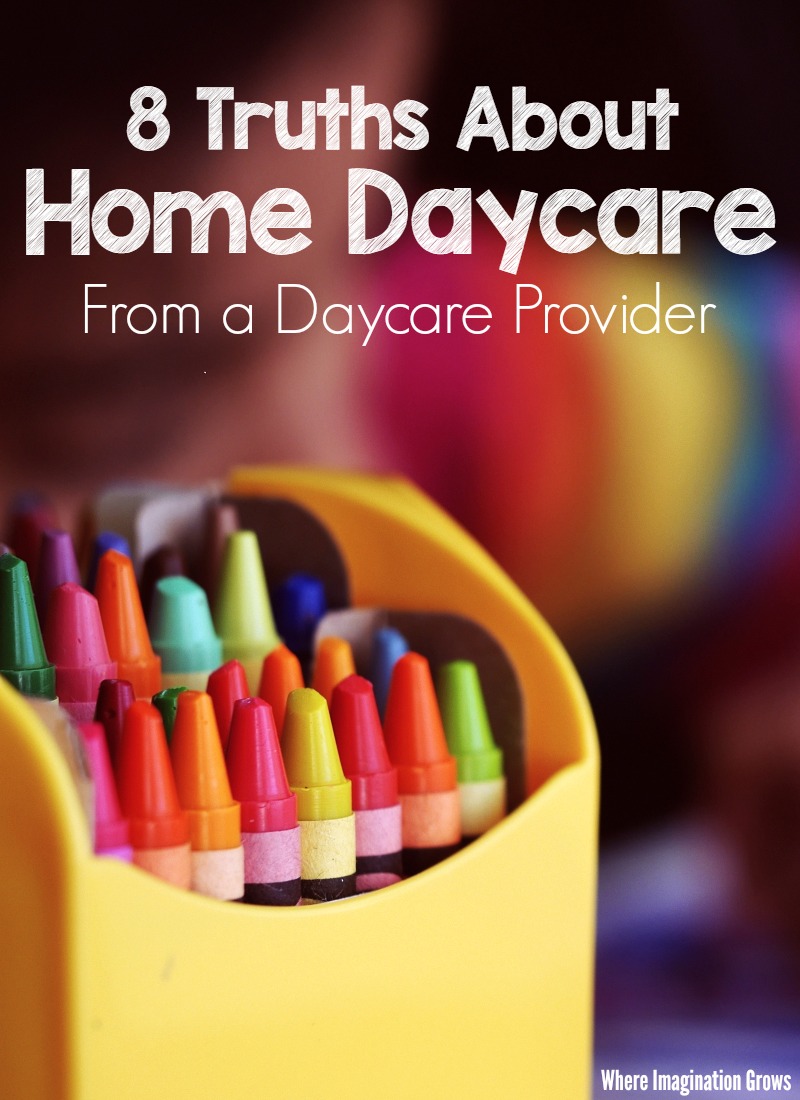
8 Truths about Home Daycare From a Provider
1.) Families form tight bonds with providers.
I spent years working in preschool programs and large daycare centers before I opened my own home daycare. While I always enjoyed the kids that I worked with and their families I didn’t have the same type of connection with them when I worked in large centers that I do now. The children in my care now feel like they are part of our family and I work with the parents as a team.
In large programs and facilities, the caregiver that you drop your child off with in the morning may not be the person that you see when you pick up. With home daycare parents see their daycare provider every day of the week and in most cases, she is the only one, there are no other teachers or assistants. It’s just the provider which means that all your communication and interactions are with that one person.
Parents also likely get to know a provider’s husband and children. Parents have access to her home five days a week, many can just walk right in. These are things that most people only do with friends and family, not business clients. For the children, the provider becomes someone that they can trust and feel safe with. Someone that encourages them to try new things and explore the world around them.
Providers also become a great source of support and advice for parents. They work together as a team to create behavioral, social, and educational goals for the child. Unlike daycare centers, which have very large staff turnover rates, a home care provider is dedicated to her business and can be someone you can rely on. Your child will be able to bond with them without the threat of having to separate from them in order to move to a different room because of age or having staff that is continually rotating. Consistency is so important for kids and having a stable caring provider helps them feel secure when mom and dad are not around.
2.) A daycare provider’s day doesn’t end when the kids leave.
Think about it your job, when do you get all the little things that make your job possible done? During business hours, right? For a daycare provider that’s rarely possible, if at all. Daycare providers are with children all day, most working upwards of 10 hrs a day. They don’t have time to do supply runs, put together lesson plans, or prep meals while there are kids running around. This means providers have to spend many hours prepping and preparing things outside of the daycare business hours.
Every night providers have to wipe down toys and equipment in the play area, clean up any leftover messes from the day, scrub down bathrooms, and usually do dishes or laundry. She spends her free time planning and preparing activities, planning meals, going grocery shopping for snacks and meals, record keeping, cleaning, and much more. These tasks add up to hundreds of hours a year spent working when the kids aren’t present. These are all things providers have to do themselves, there’s no one to delegate these tasks to, and they have to be done in a provider’s off hours.
This is why many providers have strict late pick-up policies. They spend 10 hours working with the children each day plus countless hours of additional cleaning and prepping, which (like many working parents find) leaves only a small amount of time for family time. They aren’t trying to take parents to the cleaners or make life hard for them, providers are just simply trying to balance home and work. Two things are already very much combined due to the nature of this business.
Related: 10 Pet Peeves of Daycare Providers that Parents Should Know
3.) All children are a priority to the provider.
As parents we only need to focus on our own children, sure we acknowledge the feelings of other children but our child’s needs come first. For childcare providers, they have a room full of children that they are responsible for. There is no one child or family that gets better care than the other, no child or family that is exempt from the rules the provider has set forth in her handbook. Providers have special relationships with each child in their care but at the same time, each one is a priority.
This is why providers don’t generally allow for exceptions to be made in regards to their policies.
They have to look out for ALL the children in their care, not just one or two. This is the same reason for strict rules on sickness. When a child is sent home from daycare because of illness it’s not because the provider wants to be rid of the child or can’t handle a sick child. It’s because the provider has several other children that she also needs to look out for. Plus think how uncomfortable must it be it for a sick child, who just wants rest, to be surrounded by the loud noises and commotion that usually comes with a group of children?
There will be a time when your child gets sent home due to illness, but don’t forget that there have been many other times when another child was sent home to protect your child from illness.
4.) Smaller group sizes and multiple ages encourage learning.
Family child care providers offer a comfortable home-like setting where a child will be one of only a small handful of children. This gives children the opportunity to get more individualized care and spend more quality time with a caring adult on a consistent basis. This fosters a child’s social and emotional growth through trust, affection, and security. It also allows for daycare providers to be more flexible in the services they offer or the activities they do with children.
Home daycare also accepts a variety of ages and mixed age groups are more comparable to a natural family environment or real-life situations. Mixed-age groups allow children to learn from each other, they learn from watching other ages play and interact. There are less competitive behaviors between children and less competitive pressure to achieve because the children are at various learning levels.
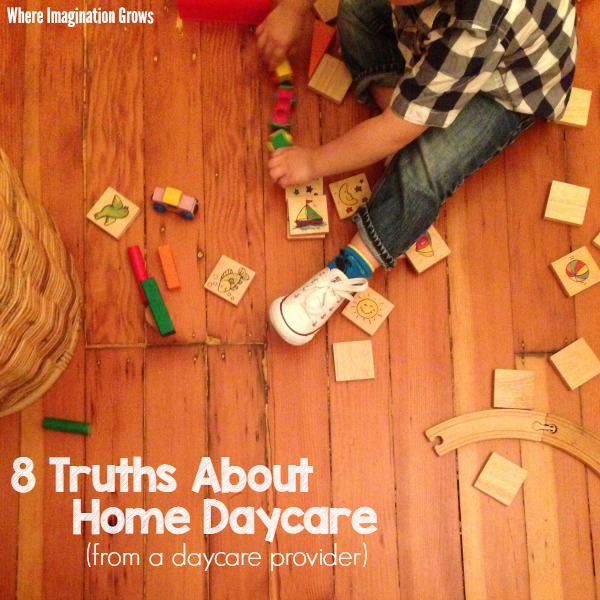
5.) Daycare providers are more than just stay-at-home moms.
Let’s be real for a minute. Running a home daycare is nothing like having your own children at home all day. It’s not at all the same.
I’m not saying stay-at-home moms don’t have the skills to watch other children or that their program would be lower in quality. That has nothing to do with it and that way of thinking is the problem. The reason that I have included this truth is that I frequently see this used to negatively describe in-home daycare providers.
“Tara is using one of those stay-at-home-moms to babysit Aiden.”
“Centers are way better. Home daycare is just stay-at-home moms that need playmates for their kids.”
“My kids won’t learn anything at a home daycare because they are just stay-at-home moms that need cash, they’re not educators.”
Those are just the tip of the iceberg of real comments people have actually said to me while referencing legitimate home daycare programs.
Just because someone chooses to offer a childcare service in their home while they have young children does not mean that they are uneducated or that their program is lacking. Maybe being able to be home with their child (the biggest perk of this business for many providers) is what let them to this career but that doesn’t mean they can’t offer a quality program. This is a hugely common stereotype that needs to be put to an end. Many SAHMs turned providers have a background in early childhood education, whether it be formal education or experience working with children. They are also required to continue their education by taking classes in child development, each state has yearly requirements for continuing education for licensed daycare providers.
Yes, there are many SAHMs that turn to home daycare to help support their families. But that doesn’t define their program. And once their home becomes a daycare business they are a self-employed business owner. Or work-at-home moms.
6.) Providers are in this business for the money.
I constantly see this comment used as proof that all daycare providers are greedy and selfish, that they don’t really like children. I’m not sure why society feels that in order to prove that we care about children, both educators and daycare providers have to offer services for free.
Childcare is a much-needed service and providers have the skills and desire to provide it. Should grocery store employees not be paid because we need to shop for food to survive? Daycare providers truly are not trying to take advantage of parents, they are trying to make a living in a field they enjoy. A career that is paid significantly less than most other careers.
This is not a career for people that want to get rich quickly, or really at all. But it is still a job and providers expect to be paid for their services.
The fact is that we do love kids, you can’t be in this field and not love them, but we also have families to support just like everyone else. We just choose to do it by offering a service in a field that we actually care about and enjoy. If you really stop and think about it a home daycare provider is opening her entire life to the families that are part of her program. Her home, family, pets, and privacy are all affected by the decision to do family childcare. It’s a major commitment and one that many people couldn’t make. That right there should show how dedicated a provider is to their job.
Related: 10 Things Parents Should Expect from a Daycare Provider
7.) Home daycare providers are not the parent’s employees.
There are major differences between a home daycare provider and babysitters or nannies but the main one is that providers are not employed by the families in their program. Home care providers run a small business that offers a service parents can choose to use for a fee. This means that she has a set of professional goals she wants to achieve and rules for how her business is run in order to achieve those goals.
If you feel like you need to ask your provider to change several policies, anything from scheduled time off to hours of operation, then it’s best you find someone who will fit better with your needs. Even if you really like the provider on a personal level. Not agreeing with her policies and constantly trying to get them changed will only be a headache for both of you that usually results in the dissolution of services on negative terms. Neither the parent or the provider wants to have a relationship like that, it’s best to find someone who’s policies matches what you are looking for rather. Each provider has a set of policies that work best for her and her family which means that each provider may have slightly different policies. It’s very likely you’ll find someone that matches your needs, even if the first couple of interviews don’t.
8.) Not every provider will be a good fit (even if you want them to be).
To me, this is where the majority of issues with daycare providers arise. It’s one of those truths about home daycare no one likes to think about.
A family expects that they will pick a provider and everything will be roses and rainbows. The truth is sometimes you just clash or your child struggles to adjust. Sometimes no matter how hard you or the provider try, you just can’t make it work. I’ve had kids in care that I loved to death but had to part with because the parents and I ended up clashing over policies they had no issues with during interviews. I’ve had parents that are amazing and but I had to let them go because the child never felt comfortable and adjusted.
You have to be open about your parenting and ask questions during your interviews with providers. That way both you can decide if it will be a good fit or not. Don’t sugar coat behaviors or downplay family routines.
Do your homework, ask questions and evaluate the space in terms of how your child will do. You know your child best. Ignore the price (obviously after determining they are in your price range) and the flashy toys or marketing. Look at the program and space in terms of how it will affect your child.
- Have a child that is sensitive to noise? Is there space for him to go when overwhelmed?
- A provider that takes lots of field trips sounds amazing but to a child that needs consistency and structure, this might not be a good fit.
- Are you an attachment-style parent? Does the provider incorporate this style into her program? How will you prepare your child to adjust if not?
There are so many things to consider but even then sometimes it’s just doesn’t work out. It’s hard when it happens and no provider likes to see it happen.
The overall fact is that you picked your provider and you need to do your homework before starting your child. I frequently get inquiries where the only question people ask is what I charge. There is so much more to a daycare than what they charge and cheaper isn’t better always. Look for quality childcare providers that offer an engaging environment for your child, not just who is cheapest. I understand that everyone has a budget but don’t decide on potential providers simply by what they charge. Interview several in your price range and decided what one matched your values and needs the most. The one you connect with the most.
Communication is vital to a successful home daycare setting. Find someone that you feel comfortable with and feel like you can easily communicate with.
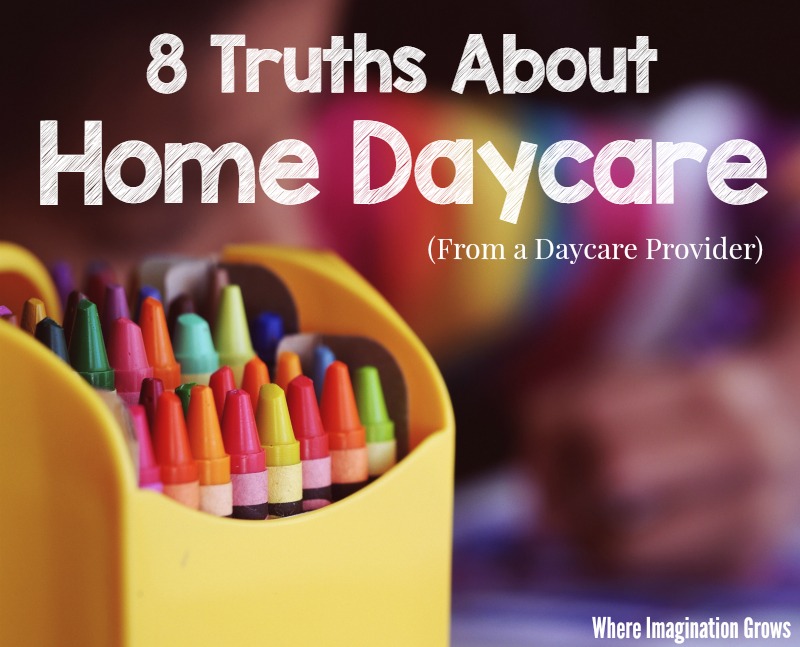
Want to learn more truths about home daycare? Check out these posts:
5 Myths About Early Childhood Educators // Preschool Inspirations
What an In-Home Preschool Looks Like // Things to Share and Remember
What Does a Childminder Do? // Clare’s Little Tots
More Than Just a Provider // Little Sprouts Learning
Not “Just” a Preschool Teacher // Stay At Home Educator
**Terminology note: Many providers feel that the term “daycare” is derogatory and are trying to move away from it. Many prefer ‘child care’ over ‘daycare.’ While I support this effort, I have chosen to use ‘daycare’ in this article because there is a vast majority of people outside of this field that are unaware of this preferred usage who still use the terminology of ‘daycare.’ This article is meant to reach the community outside of just child care providers and hopefully make many in the community aware of all the work providers do each day. To reach that audience, we needed to use the daycare terminology. It is not meant to offend or devalue our career paths.**
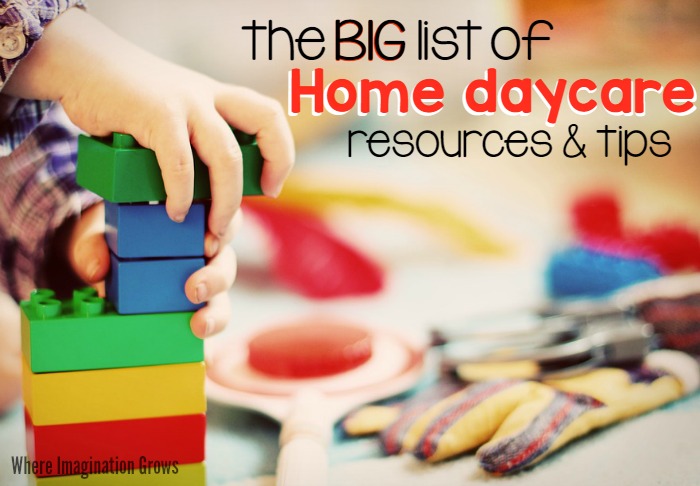
Looking for more post about running a daycare? Check out my daycare page to learn about starting or running an in-home daycare.
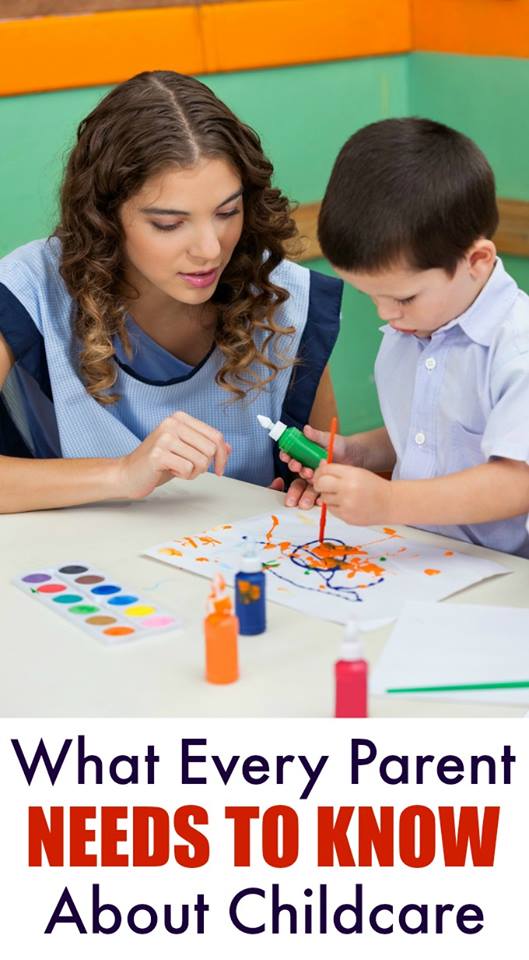
Family childcare providers rock! Thanks for pointing this out! 🙂 Great article.
I thought that this was a great article to read. Until I got to #8 which I only disagree with slightly. The reality is, at least in my area, Family Child Care homes are dwindling. There is more need than spots open. So for me, I am at the advantage to be picky about who I invite into my business and home. I get to pick the family that fits best into my business. This is of course great for me, as long as I don’t take advantage of it and jack my rates, enforce unreasonable policies or terminate at will for the slightest offense. This is not idea for parents looking for care of course. But I find that the more I am honest and upfront with my business, the more parents understand and know about why things are the way they are. Communication is key so I thank you for writing this so I could share it with others.
Hi Michelle! Yes! I totally think that you, as the provider, should be picky. Most definitely! I’m sorry if you though I was implying that providers don’t get to pick who they take. I just meant that comment in regards to parents that get accepted and commit to a provider, then turn and make every issue the provider’s fault or take issue with policies. I want parents realize they need to find someone that fits with their family, not just the cheapest because choosing price over quality or connection is setting the stage for failure.
Thanks for reading and commenting!
Oh yes! Totally agree that once the care starts, the parents are in the drivers seat there. They can either go along with it and be easy going parents or be the ones we dread seeing the car in the drive every morning. 🙂
I love your post. Good points that you communicated better than I could. I agree, we are in this for the money. It is our business. If we weren’t, we couldn’t (and would not) provide the quality of care that children need & parents want! It’s necessary that we make a living and continue to be able to offer a valuable service in our communities! Sharing today!
I love this post and agree with every single point. I don’t know why there is often a negative view towards those that choose to invite families into their homes and care for their precious babies. I love my job as a childminder Thank you for fighting our corner 🙂
Wow! Thanks, you put my words in an article, I’m a coordinator in a group of home child care providers in my area, and sadly I understand why some people still has that idea that we are “The lady in that house that babysit children”. Some providers never take a step to wash away that image even if they have hours and hours of ECE workshops at year. But there are some others that take very serious their educator role and put so many hours, effort, and money to improve their programs going beyond standards to provide a nurture environment and great curriculum, even when the parents aren’t very cooperative or engaged in our work.
You mentioned that with home daycare parents see their daycare provider every day of the week and in most cases, she is the only one, there are no other teachers or assistants. Do most home daycare centers have a variety of activities for the children to participate in? My cousin has to get a job and can’t care for her child and needs to have someone watch her during the day. It seems like finding a place like this could be very helpful for her.
Yes, in most home daycare settings there is only one adult provider. This is why her group size is much smaller than what you may see in a commercial daycare center and why she is the only one that parents sees and interacts with. Home daycare is usually cheaper than a daycare center too. Generally home daycares have areas in their home (whether it’s a separate space or integrated into their living space) that they have converted to a play area for the kids, with many toys and kid sized furniture, and they often do projects and special activities. Home daycares come in every shape, size, and learning style so I’m sure there is a daycare that would be great for your cousin out there. I’d check with your local child care resource and referral network or even just browse craigslist or care.com to get an idea of what’s out there.
Here’s a link to a great post on what home daycares can look like from a friend of mine. Hope this helps!
I’m so happy I came across this article. I have Google Alerts setup for daycare blog posts and most everything I see is negative, it is upsetting. I’m glad to see a fellow daycare provider put this much needed, honest, information out there. I can relate to most everything you stated. I have formed such an incredible bond with my daycare families that it is so hard to say goodbye when the time comes for them to move on. I will be following you for sure!
Love my job … 40 plus years ….. thanks for the great article..
Great article, I’m going to share this on our Facebook page.
Regards,
Michelle Beam
Manager of Vancouver Island Childcare & More
http://www.vancouverislandchildcareandmore.com
I’m glad that you have taken the time to mention using stay-at-home daycare’s are not necessarily bad. I know a lot of mothers in my neighborhood who have better degrees than I do. In the end, picking a daycare is not about where it is, but how good it is. As long as you do your research I don’t think you need to worry about where the daycare facility is.
I strongly agree. Home day care industry is not really an ordinary form of business because it critically molds the well-being of children. Thanks for the enlightenment.
Am happy that have joined the group of people who are well experienced and they love what i love too . Therefore I thank you all for the advise you have shared with us , may God bless you all.
Is it possible that a daycare provider (and/or particularly the husband of – a partnership of sorts) might love my daughter too much? My girl’s provider has been very adamant to me on several occasions, even telling me how jealous he is of me for having my little girl. Today my wife, who we will be divorcing soon, had a talk with the provider, and I went later to find out. Someone contacted child protective services about possible neglect and abuse, and we were contacted this past week. When I rang the doorbell of this provider, the man opened the door, refused to tell me what my wife had discussed, and slammed the door in my face, yelling at me PRIVACY! I said if it pertains to my daughter I have a right to know. HE refused to tell me and slammed the door in my face. Subsequent contact has been utterly rebuffed. I am taking my daughter out immediately. What the heck is going on (with undiagnosed very excellent played NPD wife involved with over a decade of NPD abuse on me refusing to even see that there is anything she’s done ta all)? My wife has turned a CPS visit into the daycare providers slamming the door in my face within 72 hours. California
btw- the abuse is not by the dad, and the neglect was simply a false charge for the purpose of coercion into a totally unrelated and unnecessary situation.
Daycare providers, including assistants and husbands that work in the daycare home as well, can become very attached to children. They are caring for them in their home 5 days a week for upwards of 10 hours a day, this often leads them to form tight bonds. I know providers that are called grandma/grandpa or aunt/uncle by the children and families in their care and go on to have lifelong relationships with them. I’ve told parents that I’m jealous of parts of their child’s personality, like adventurous eaters or great nappers (neither of which my daughter was). That doesn’t necessarily mean they are too attached. However, if you are feeling uncomfortable then maybe find another provider.
As for your divorce, I’m sorry to hear that you are going through that. That is a hard situation for anyone to go through. Without knowing the full story or any of the conversation had I can’t tell what has happened or what is going on with the provider. What I gather from your post she was not behind the CPS report, so there shouldn’t be any reason to make her part of that. Generally, it is recommended that daycare providers do not become involved in divorce situations. The provider is there for the child as stable and neutral force in a time of stress for everyone, they are not there to take sides. Unless a provider is in your home to witness you or your spouse parenting, they only know what they see during that small time frame of drop off and pick up. Anything else a provider knows about what goes on in your home is generally information that has been shared with her from the other parent, this is all considered hearsay in court cases.
Personally, in my own program, when parents are going through a divorce I do not discuss conversations had with one parent with the other. This is actually very common amongst daycare providers, not because they have something to hide but because they often lead to misunderstandings and “he said, she said” situations. I also do not allow for disparaging remarks or venting from either parent about the other parent, so that both parents feel comfortable knowing they are in a neutral space. Conversations should be about the child’s day in daycare, not things going on outside of it.
Set up a time with her to discuss her policy on divorce situations, knowing where she stands and that she is committed to creating a neutral environment is important. If she refuses, then I would discuss with your soon to be ex-wife and find alternative care. However, I do not recommend showing up after hours or when your child is not present without arranging it first. This will only escalate things. That said, slamming the door in your face and screaming at you is not professional. The situation may have already moved to a point where you all need to go separate ways.